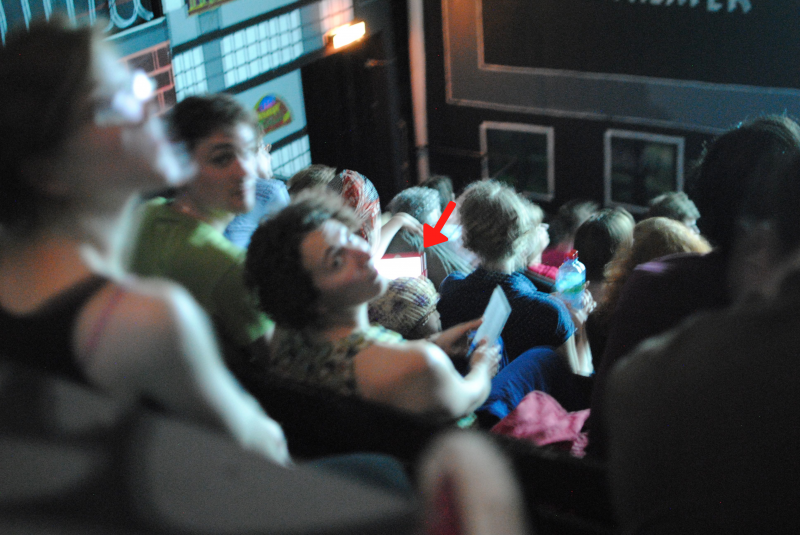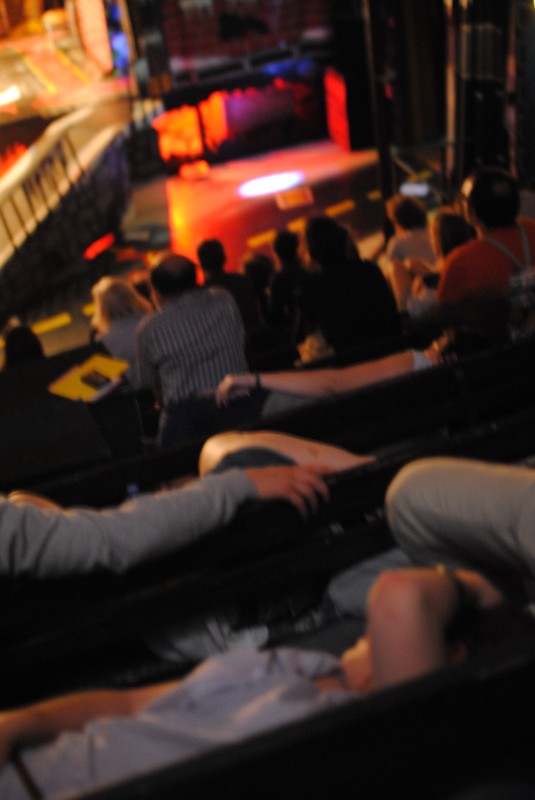John Gabriel Borkman is the next-to-last play that Norwegian heavyweight playwright Henrik Ibsen wrote. Completed in 1896, it was first performed as a reading in London in the winter of that year. Here’s what a British performance of the play looks like these days – you get the picture; serious, fraught family drama that not only captures the tumult of the fin de siècle, but also expresses something universal about human nature, the power of love, and the love of power. Probably anyway.
Now, before we proceed, let’s just say Vegard Vinge, Ida Müller, and Tront Reinholdtsen’s production, chosen by this year’s jury as Theatertreffen-worthy, has more in common with the Rocky Horror Picture Show than with the work of the esteemed Ms Shaw and Mr Rickman I linked to above.
I don’t think I’ve ever heard so much about a production and yet still had so little idea of what to expect. I read the live tweets and I’d seen the photos of the harrassed audience members, but I soon realized that until I took the plunge myself the whole 12-hour-long #Borkman experience was going to remain a mystery to me. So when it was my turn to go, I was all anticipation and determination. Fear not blog readers, I thought, I will EXPLAIN, once and for all.
Let’s say from the off that I was not well-equipped to deal with the task at hand. Firstly, I only took a 1L bottle of water and some Mentos as provisions. But more importantly, I have never in my life been faced by such an onslaught of sounds, images, ideas, fake blood, and penises – let alone have to get home afterwards and write something coherent about it. My mood swings were at an all-time high, at least one hitting every half hour.
Therefore, I propose the following: I will organize my thoughts thematically according to these moods – Discomfort, Boredom, Fascination, Confusion, Amusement, Exhaustion, and Awe (capitalized for added Germanness).
Discomfort
There’s a great word in German to describe how I felt when I passed the ticket check: “unwohl.” The best way I can think to translate it is “ill at ease”. Dark passages led past rooms where actors were standing stock still in garish costumes, staring at the audience as we decided whether to go left or right. It felt very possible that I could take a wrong turn and find myself standing in one such room, lost in the play itself.
Director Vegard Vinge made sure this feeling stayed with me throughout the performance. He lurks at the lighting and sound desk behind the audience (directly behind me, as I’d chosen the back row mistakenly thinking it might be safer to be further from the stage) and you never knew when he was going to come barging out into the galleries along the side of the auditorium and start tearing down the set, or walk right onto the stage and create a drama all of his own – usually involving urinating, mostly onto himself or other people. The woman sitting next to me was actually injured when Vinge spontaneously decided to remove the bench in front of us.
This gross-out theatre is nothing new, and it was my least favourite part of the performance – an extended live video of Borkman being anally penetrated by a huge dildo labeled “The Law” deserving special mention in this context. But on the other hand, watching the stage when nothing was happening, no Vinge in sight, was the best kind of feeling unwohl. I felt like I was staring at one of those creepy ‘spot the ghost’ photos, preparing to get a shock at any moment.
Boredom
I can’t imagine surviving Monday’s performance, in which Vinge apparently did nothing but count for 6 hours before the curtain even went up. Although we were spared much counting last night (I think he got to 300 at some point, but that’s small fry), the 45 minutes of reading from the dictionary had me nodding off before the play had even really begun. One audience member got her iPad out.

iPad glow, Photo: Miriam Sherwood
Later in the night, the moments of boredom came from the sheer excessive repetition, stretching a slapstick gag like ‘woman walks into a wall’ beyond its limits (‘woman walks into a wall’ x 20). It reminded me of those extended dream sequences in Family Guy, where even if you were laughing at the beginning you sure won’t be after another few self-indulgent minutes of it. There was also a fair bit of waiting around for scene changes, but they were worth it (see “Awe”).
Fascination
I had intended to leave every two and a half hours or so to write a paragraph of this post, but to my surprise I found it really hard to tear myself away until around 8pm when my stomach rumbles threatened to compete with Vinge’s deranged yelling.
I put my fascination down to the style of acting in the production. All the actors – and technicians – wore full masks throughout the performance (a feat in itself, those things must be boiling) and together with their bright, cartoony costumes they made the performers look like Chucky’s less friendly relatives.
With masks covering their mouths, speech had to come from some external source. All the voices were completely distorted, both in pitch and tempo, and I couldn’t work out if they were pre-recorded or if someone else was speaking the lines live – sometimes I thought I spotted Vinge himself muttering into a microphone whilst an actor was ‘speaking.’ Unfortunately the group refuses to give interviews or attend a post-show discussion at the Theatertreffen, so I guess we’ll never know. Whatever the trick, it had the strange effect of being the mechanical trigger for the actors’ movements. Because the sound was coming from somewhere else, they had to wait for it before they could do anything.
Each character has its own signature sound, not just in terms of the voice, but also their footsteps. If they weren’t speaking, regardless of whether or not another character was speaking to them, or if their footstep sound wasn’t playing, the actors remained completely still. When they did move, it was with a robotic preciseness that suited the mechanical sound-triggers-movement system exactly. The actor playing Erhart, Borkman’s son, is a great example. He never made any movement outside the range of a doll or computer game character, even if that meant letting his trousers fall down as he walked. And the walk is crucial – he managed to set down his feet without ever straightening his legs or stepping on his heels, so that he almost looked like a weightless marionette being controlled by strings from above.
Confusion
It’s probably clear at this point that lot of things that have nothing to do with Ibsen’s play take place during the performance. An army invasion, for example. Borkman has two stories going on simultaneously; the tragedy of power-hungry Borkman and the comedy of power-hungry Vinge. But the line is deliberately blurred between the two, with Vinge referring to himself as Borkman, and to Borkman as “Father.”
And then there’s that fact that you can leave for 20 minutes, and when you come back there’s a naked woman on stage who stays there for the rest of the show, at one point even on a crucifix, and you have no idea who she is. And bits of the set that were on the stage before are now mysteriously on the seat you had been sitting on.
Amusement
Unexpectedly, that is, if you read the play in preparation like I did, a lot of things in this version of John Gabriel Borkman are funny. At least in this version. I made a list:
– A skeleton orchestra
– References to other famous father/son conflicts, including light sabres
– Exaggerated sound effects accompanying everything from the heaving of cardboard rocks to a comb through hair
– Angela Merkel dangling over parliament
Exhaustion
I know, this one seems obvious, after all it soldiered on unrelentingly from 4pm til 4am. But it wasn’t just that, it was the heat. I was melting. I could see Vinge was melting. I could smell all of us melting.

Dozing in the auditorium, Photo: Miriam Sherwood
Awe
Finally, the unbelievably epic set design. It starts with the rooms you pass on your way in, and continues along the walls of the auditorium with passages and balconies. On stage, a larger-than-life doll’s house, with curtains that can be pushed back to reveal more and more rooms. Over the course of the evening, bits of the house get pushed back, sawn off or otherwise demolished, and you realize you hadn’t even begun to fathom the depth of the stage. Waiting back there is a war zone, a mountain range, and a glittering ocean as a reward for making it to the end of the night. The area beneath the stage transforms from glacier to fiery underworld. All this in the painstaking detail of a chaotic cartoon nightmare.
Impossible to sum up as the production is, I think “Awe” is probably the right note to sign off on.